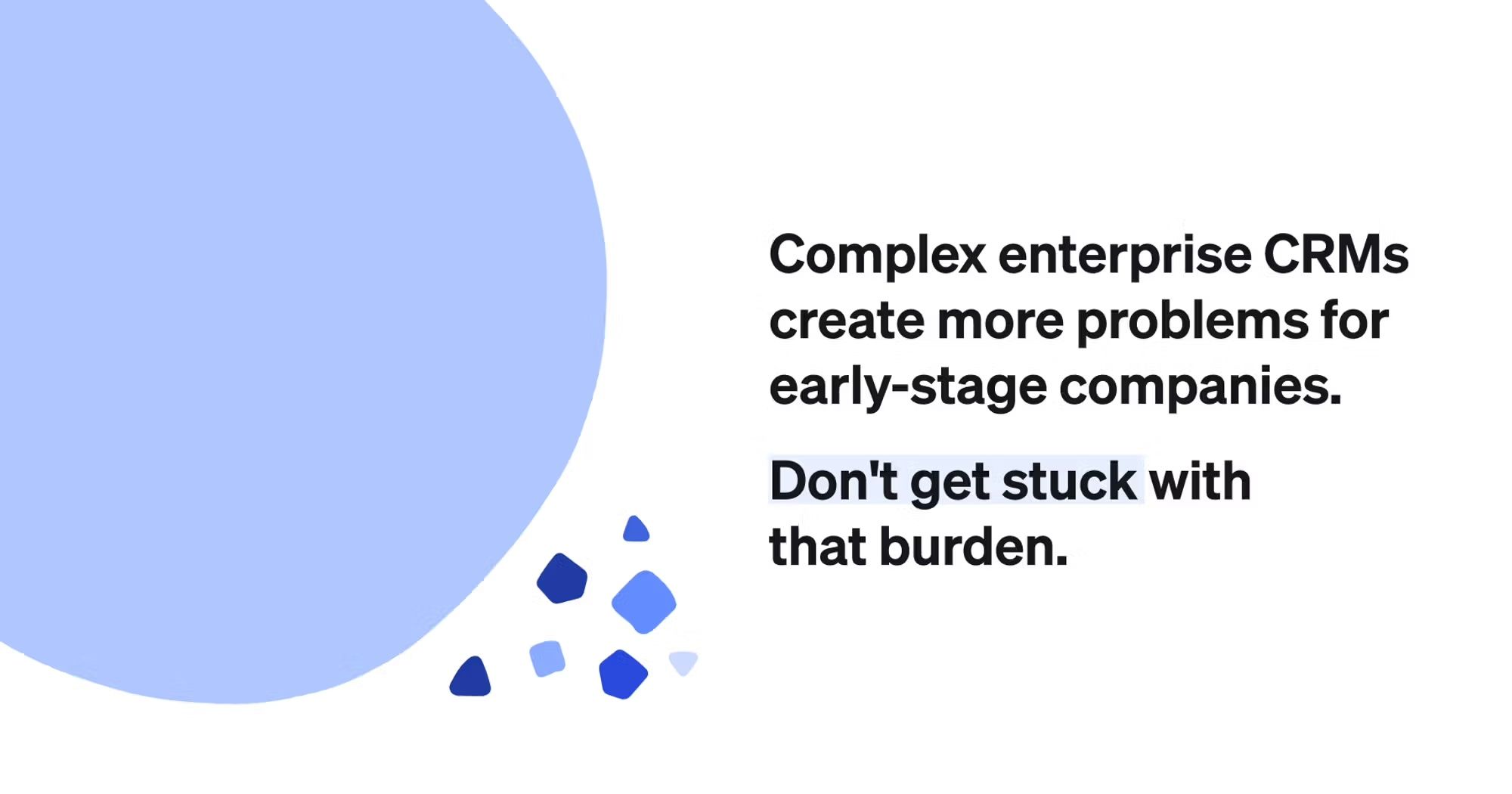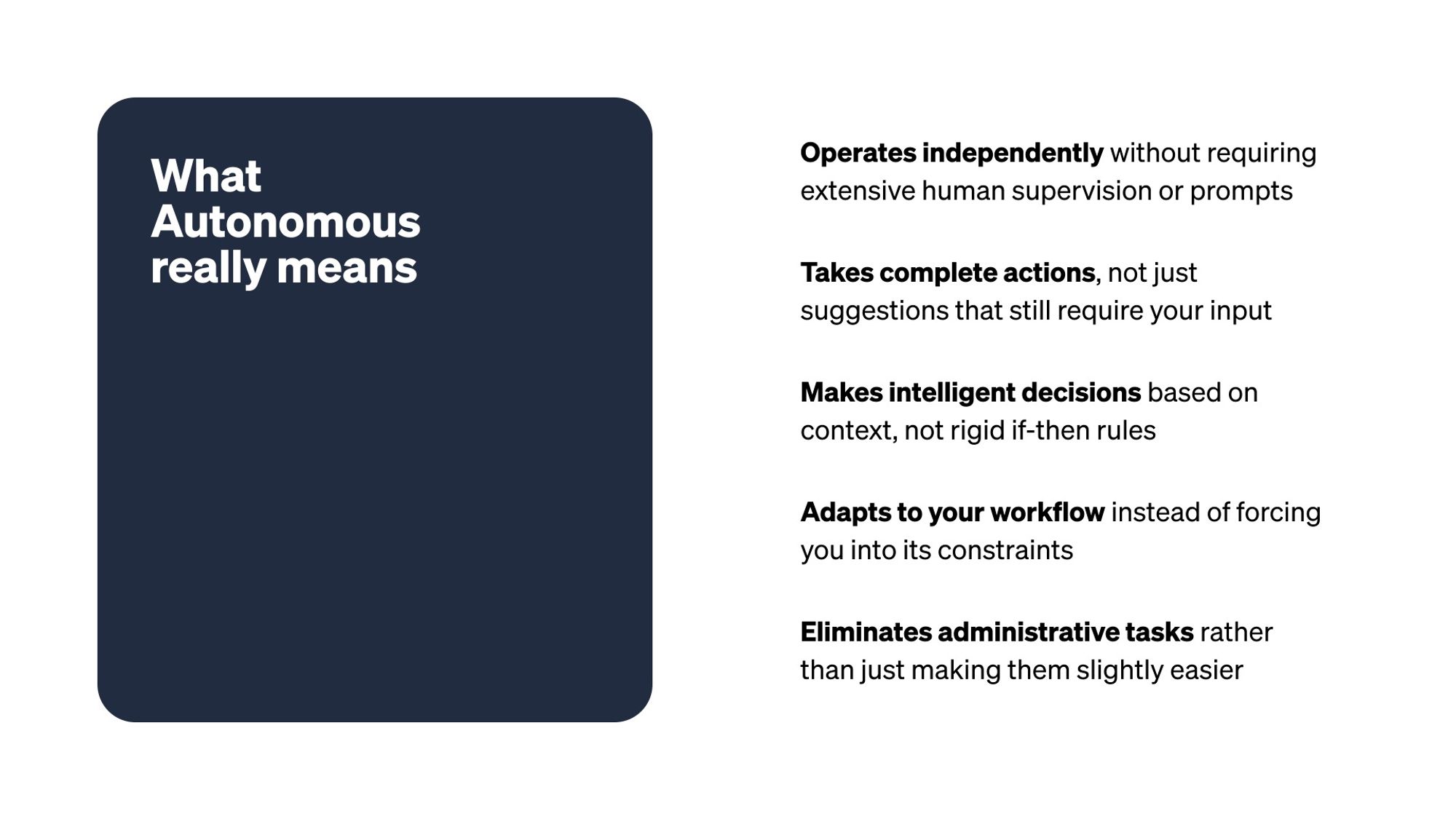Why CRMs must become autonomous (not just AI-Powered)




Your sales team spends 72% of their time not selling. Your CRM—the tool meant to help them sell—is the primary culprit.
Despite decades of evolution and billions in "AI enhancements," most CRMs remain hungry beasts that devour your team's time. They demand constant feeding: manual call logging, pipeline updates, data entry, and endless administrative maintenance. Even in 2025, your salespeople are still digital janitors, cleaning up databases instead of closing deals.
This isn't just inefficient—it's a competitive death sentence.
The database trap
As founders who've scaled multiple companies, we've lived this nightmare. You probably have too.
Maybe you started with spreadsheets and Gmail, watching critical opportunities vanish into email threads. Then you "upgraded" to a lightweight CRM, only to discover you needed separate tools for call recording, email tracking, and data enrichment—creating a fragmented tech stack that required more management than it provided value.
Or perhaps you invested in an enterprise solution from day one, only to realize you'd hired an expensive digital filing cabinet that needed a full-time administrator just to keep it organized.

Even the latest wave of "next-gen" CRMs haven't solved the fundamental issue. Most still require extensive manual data entry, constant configuration, and human oversight for every automated action. They've added intelligent features on top of database architectures—but the underlying paradigm remains the same.
The core problem isn't the quality of individual CRM products—it's that the entire category was built around the wrong premise: that humans should serve the system, not the other way around.
What autonomous actually means

Autonomous doesn’t mean “AI-assisted” or “workflow automation.” Those are just fancy ways of making data entry slightly less painful.
True autonomy means your CRM operates like a skilled teammate—or more precisely, like an intelligent agent. It anticipates your needs, makes decisions, and takes complete actions without being managed. It’s the difference between an assistant who constantly asks for instructions versus one who sees you’re running late for a client call and already has your briefing ready.
An autonomous CRM:
- Operates independently without requiring constant prompts or supervision
- Takes full actions—not just suggesting next steps for you to complete
- Makes intelligent decisions based on context, not rigid if-then rules
- Adapts to your workflow, instead of forcing you into its constraints
- Eliminates administrative tasks, rather than just making them slightly easier
This represents a fundamental shift—from tools that require management to systems built as agents that manage work on your behalf.
You may ask what the difference between an "autonomous" and an "ai-native" CRM is.
- AI-native: Describes the underlying architecture—it’s built from the ground up with AI at the core.
- Autonomous: How we want the CRM to feel—intelligent, proactive, and self-moving.
The path to Autonomous CRMs
The technology exists today to build truly autonomous revenue systems. The question isn't whether it's possible—it's whether companies are bold enough to fundamentally rethink how CRMs should work.
We believe the future belongs to systems that work for you, not the other way around. That's why we built Clarify as the first step toward true CRM autonomy.
Early steps toward autonomy
The autonomous CRM isn't science fiction—early implementations (this is all live in Clarify, for example) are already transforming how revenue teams operate:
Intelligent preparation: Systems that automatically generate comprehensive call briefs from past conversations, highlighting key concerns and suggesting talking points without manual research.
Ambient documentation: Meetings are quietly recorded and converted into detailed notes with action items automatically assigned to the right team members.
Intent recognition: Buying signals detected in conversations automatically create deal records with living summaries that evolve based on every interaction.
Conversational assistance: Instead of struggling with follow-up emails, you can chat with meeting transcripts to generate personalized copy that captures conversation nuances.
These capabilities are already eliminating hours of administrative work while keeping deal information current without manual updates.
The fully autonomous vision
The early capabilities above represent the foundation. The complete autonomous CRM will feature:
True ambient intelligence that identifies buying signals across all channels and takes immediate action—updating deal stages, pulling relevant resources, and drafting responses without human intervention.
Predictive deal management that recognizes when opportunities stall and automatically implements proven next steps, scheduling meetings and crafting outreach that matches your communication style.
End-to-end workflow automation that handles the entire customer journey from first touch to renewal, requiring human input only for relationship building and strategic decisions.
The ultimate goal: You focus on selling. Everything else happens automatically.
The autonomous advantage
This isn't just about saving time—though eliminating 72% of non-selling activities is transformative. It's about fundamentally changing how revenue teams operate.
Your team experiences:
- Pure focus on relationships instead of wrestling with databases
- Perfect preparation for every interaction without manual research
- Consistent follow-through that never lets opportunities slip
- Data-driven insights that improve with every conversation
- The joy of selling without the administrative burden
Your business sees:
- Bigger deals because you never walk into meetings unprepared
- Shorter cycles with automated, intelligent follow-ups
- Higher win rates from data-driven recommendations that actually work
- Better retention through systematic relationship management
- Faster growth as the system identifies expansion opportunities automatically
One founder told us: "It's not just that Clarify saves time—it makes selling fun again. My team is happy because they're doing what they love: building relationships and solving problems, not feeding a database."
Beyond CRM: the future is autonomous
Traditional CRMs were built for a world where data was scarce and computers couldn’t think like they can now. In 2025, data is abundant and machines can reason and take action.
This autonomous evolution won’t be exclusive to CRMs. It’ll be prevalent throughout the full GTM software stack as agents become less of one-off tools and more natively integrated into the workflows of software products.
This is the vision we believe in - Clarify isn't just a better CRM—it's the beginning of a Unified GTM Platform that handles the entire customer journey autonomously. You maintain the essential human connections and strategic oversight while Clarify orchestrates everything else: prospect lists, outreach, lead qualification, meeting preparation, proposal generation, contract negotiation support, and customer success monitoring.
The future of gtm is autonomous. And it's already here.
Get our newsletter
Subscribe for weekly essays on GTM, RevTech, and Clarify’s latest updates.
Thanks for subscribing! We'll send only our best stuff. Your information will not be shared and you can unsubscribe at any time.